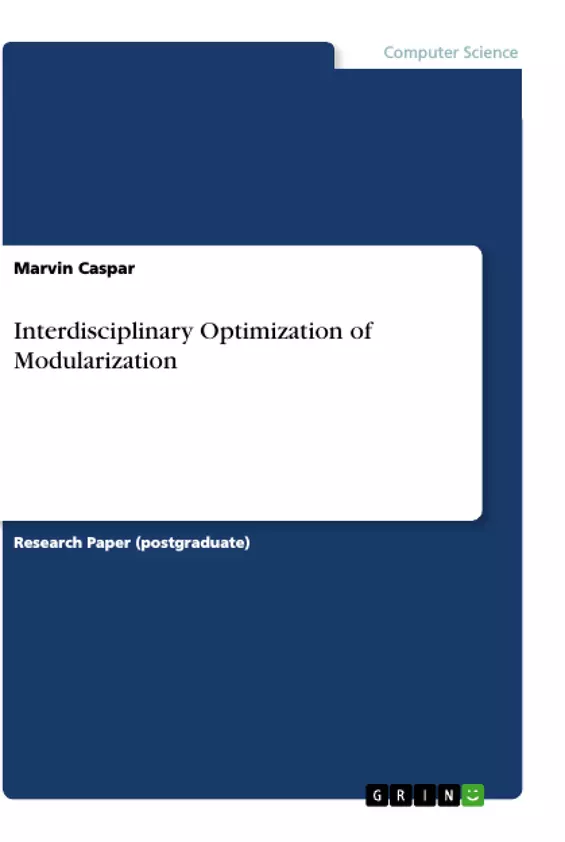In this research project, modularization will be investigated in the field of different engineering disciplines and in its interdisciplinary impact. Various experts are interviewed to reconcile academic research and modularization in practice as part of this research project. On the one hand, different strategies and tools are presented and on the other hand, metrics for the optimization of modular architectures are shown. This research project aims at the comparison of different modularization approaches and the discussion of interdisciplinary modularization supported by views from several experts.
The challenges of customizing production, meeting shorter innovation cycles, anticipating volatility in demand patterns that are diffcult to predict, and selling products at competitive production costs in different local markets are forcing companies to adopt innovative production concepts. Modularization is an essential way to reduce internal complexity and costs and represents a central strategy for today's companies by dividing a whole into parts called modules. The increasing diversity in production and the growing influence and interconnectedness of different engineering disciplines within the product architecture make modularization a multidimensional optimization problem. Numerous different strategies and tools come into the picture during the formation of modular product structures.
Inhaltsverzeichnis (Table of Contents)
- Introduction
- Context and Motivation
- Problem Statement
- Research Objective and Goals
- Contribution and Expected Results
- Structure of the Work
- Foundations of Modularization
- Variant Management
- System Architecture
- Modular and Integral Product Architecture
- Types of Modularity
- Functional and Physical Independence
- Interface and Main Unit
- Module Concept in Different Engineering Disciplines
- Goals and Chances of Modularization
- General Requirements for Modularization
- General Possible Advantages and Disadvantages of Modularization
- Expert Interview and Modularization in Practice
- Basic Information
- Evaluation of the Expert Interview
- Methods and Strategies for Optimization of Modularization
- Abstract Procedure for Modularization
- Design Structure Matrix (DSM)
- Modular Function Deployment (MFD)
- Management Engineering Tool for Unified Systems (METUS)
- PULSE-Eco for Assisting Modularization
- Further Assistance Tools
- Change Impact Analysis
- Complexity Management
- Variant Tree
- Roadmapping
- Metrics and Performance Indicators in Interdisciplinary Modularization
- Hardware Modularization
- Important Areas of Application
- Typical Metrics
- CPI/CPN-Method
- Coupling Index (CI)
- Software Modularization
- Important Areas of Application
- Typical Software Metrics
- Related Work
- Hiding and Inheritance Factors
- Coupling Factor
- Interdisciplinary Modularization
- Hardware Modularization
- Conclusion
- Summary and Assessment of Contribution
- Suggestions Future Processing
Zielsetzung und Themenschwerpunkte (Objectives and Key Themes)
This research project delves into the multifaceted topic of modularization, aiming to investigate its application across different engineering disciplines and explore its interdisciplinary impact. The goal is to identify and analyze effective strategies and tools for optimizing modular product structures, bridging the gap between academic research and practical implementation. This involves examining various expert perspectives on modularization and its real-world applications. The project aims to facilitate a comprehensive understanding of modularization principles, advantages, challenges, and its potential for improving product development and production processes.
- Interdisciplinary Optimization of Modularization
- Strategies and Tools for Modular Product Structure Optimization
- Expert Perspectives on Modularization in Practice
- Metrics and Performance Indicators in Modular Architecture Evaluation
- Impact of Modularization on Product Development and Production Processes
Zusammenfassung der Kapitel (Chapter Summaries)
The research begins by establishing the context and motivation behind modularization, highlighting the increasing need for product customization and flexibility in today's dynamic market. The first chapter presents the problem statement and outlines the research objectives and goals. It also provides a comprehensive overview of the work's structure. The second chapter delves into the fundamental principles of modularization, exploring concepts such as variant management, system architecture, and different types of modularity. It also examines the application of module concepts across various engineering disciplines.
The third chapter analyzes the advantages and disadvantages of modularization, exploring the key requirements for successful implementation. Chapter four presents an in-depth examination of modularization in practice through expert interviews, providing valuable insights into real-world applications. This chapter sheds light on the challenges and benefits of modularization from the perspective of industry professionals.
Chapter five focuses on various methods and strategies for optimizing modularization, covering a range of approaches, including design structure matrix, modular function deployment, and specific tools like METUS and PULSE-Eco. It also discusses additional support tools for managing complexity and analyzing change impacts. This chapter provides a comprehensive overview of available techniques for enhancing modularization processes.
Schlüsselwörter (Keywords)
The core keywords of this research project encompass the key concepts and focus areas: modularization, interdisciplinary, product architecture, optimization, strategies, tools, metrics, performance indicators, expert interviews, and industrial application. The research investigates the multi-faceted nature of modularization, encompassing its application across engineering disciplines, its impact on product development and production processes, and its optimization through various methods and tools. The project also emphasizes the importance of real-world insights gained from expert interviews and the utilization of performance indicators for evaluating modular architectures.
Frequently Asked Questions
What is the main goal of modularization in engineering?
Modularization aims to reduce internal complexity and costs by dividing a product into independent parts called modules, allowing for better customization.
What is the Design Structure Matrix (DSM)?
DSM is a tool used to represent and analyze dependencies and relations between different components or tasks in product development.
How does software modularization differ from hardware?
Software modularization focuses on metrics like hiding and inheritance factors and coupling factors to ensure code maintainability and flexibility.
What are the advantages of an interdisciplinary approach?
It reconciles different engineering views (mechanics, electronics, software) to optimize the overall product architecture and production concept.
What role do expert interviews play in this research?
They bridge the gap between academic research and practical implementation by providing real-world insights from industry professionals.
- Arbeit zitieren
- Marvin Caspar (Autor:in), 2021, Interdisciplinary Optimization of Modularization, München, GRIN Verlag, https://www.grin.com/document/1156944



